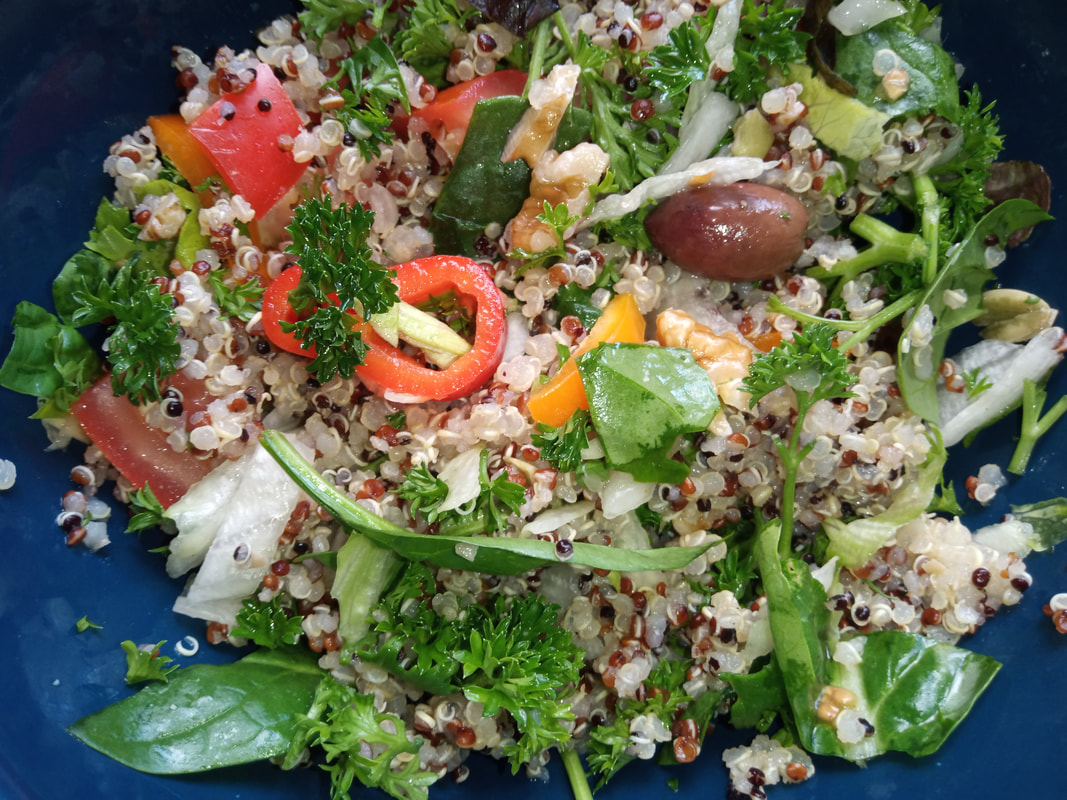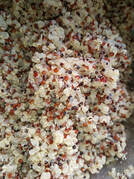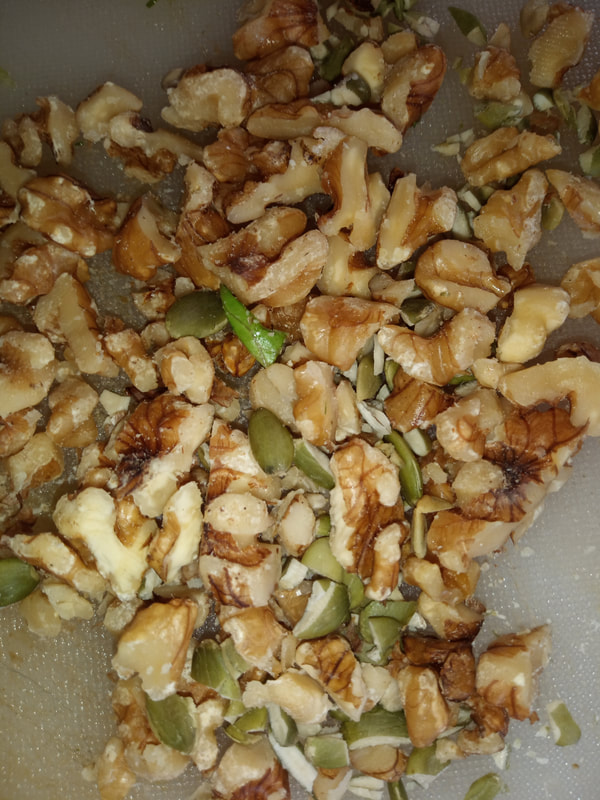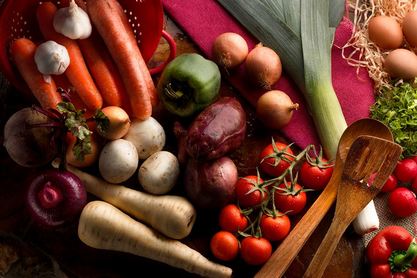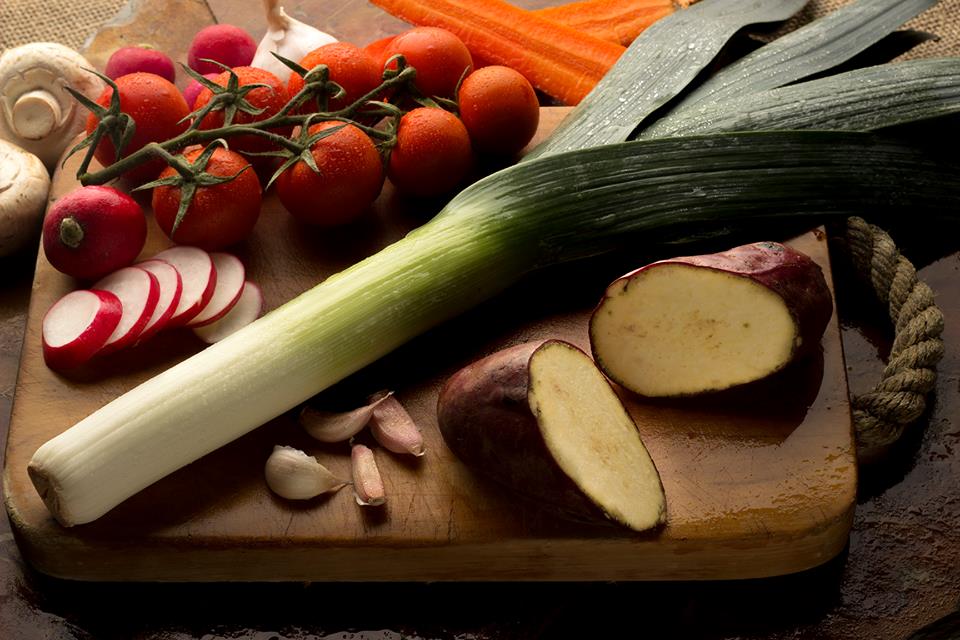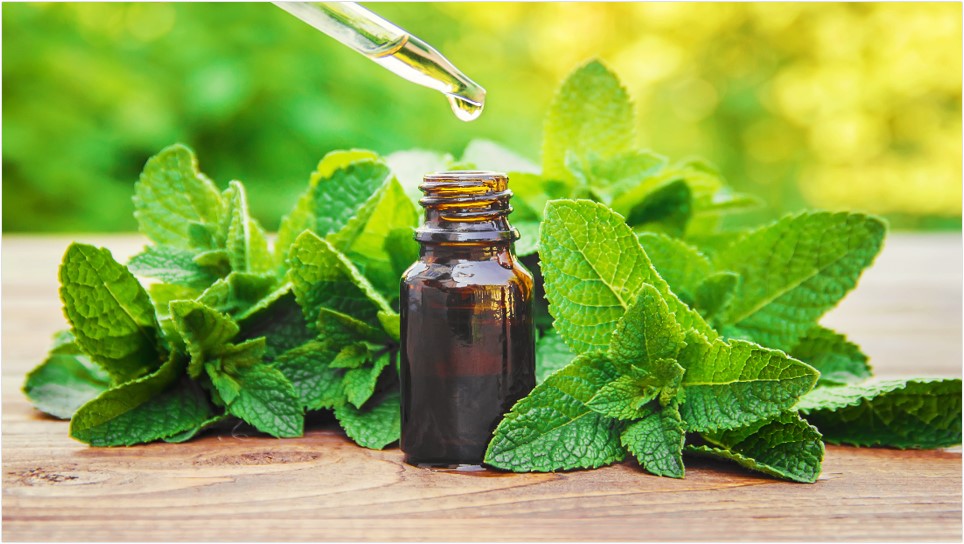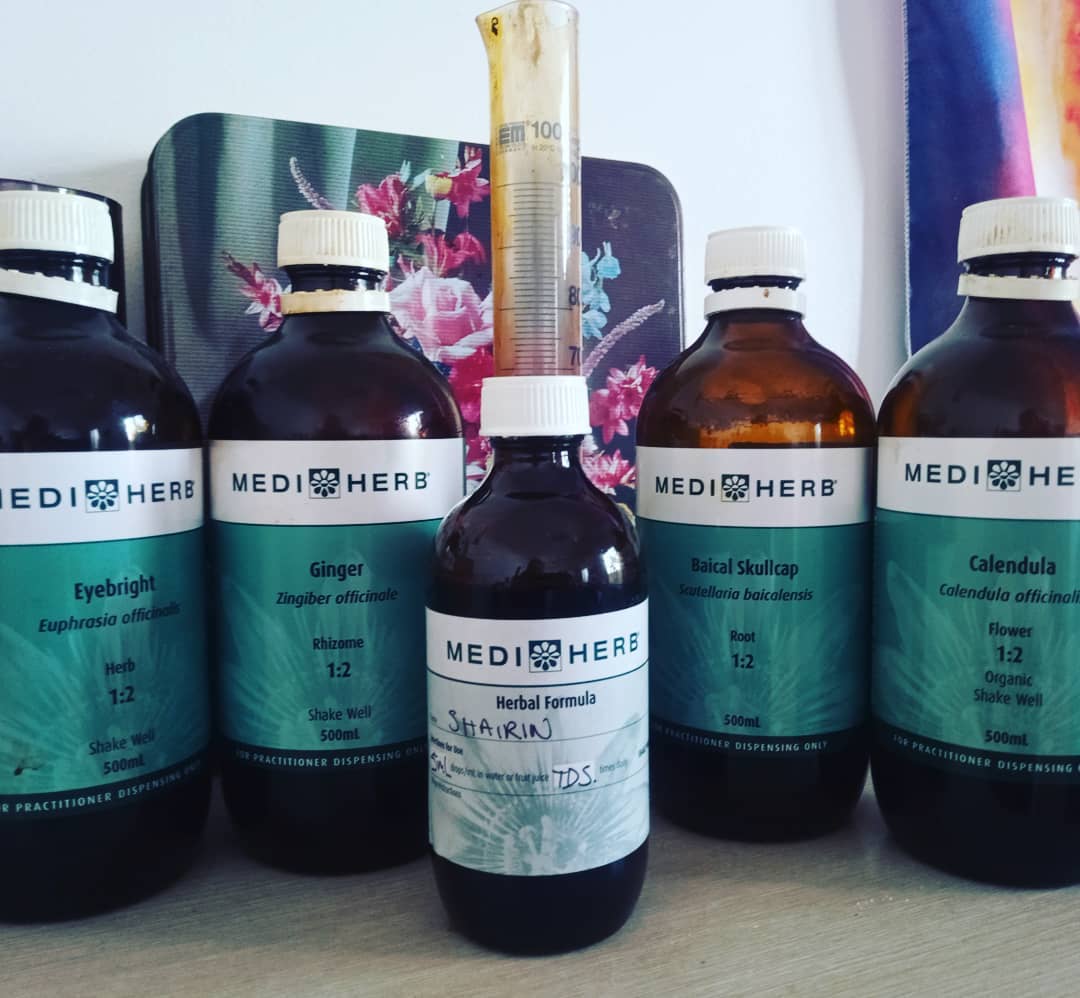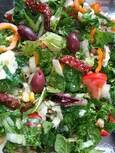 Spring is definitely here in Brisbane. The weather is warming up and there is a renewed sense of optimism in the air. Nature is flowing and growing in its season of new life and renewed vitality after the hibernation and nurturing foundation of winter. We can flow and grow in alignment with the Natural World too. Clearing out the clutter of our cupboards, wardrobes and bodies is naturally felt at this time. Gentle cleansing of the body is as simple as 1. Drinking plenty of water – 6-8 glasses per day rehydrates skin and tissues, improves digestion and renews the 80% water content of our bodies 2. Spending time walking or gardening is a gentle and enjoyable form of exercise. The weather is inspirational for all forms of exercise and moving the body is an excellent detoxifier. As we move the lymphatic fluids of the body are mechanically dispersed through their system and nutrients are delivered to cells and tissues whilst any wastes are simultaneously removed. 3. Taking time to ‘smell the Roses’. Appreciating the beautiful displays of nature, whether in flower blooms, foliage, butterflies birds or the changing colours of the sky is actually a form of meditation included in the Indian Vedas within the practise of Yoga which is essentially Union of the Self with the whole universe. The universe is vast yet nature and the earth we stand on is a vital and part of the whole. As are we. Speaking of vitality and nature…. 4. Is swapping commercially, over processed, convenience and comfort foods for nutritious whole foods and is a simple choice with the availability of fruits and vegetables at this time of year. Adding some summer vegetables, herbs and fruits to the hearty winter menu helps by keeping up the sustaining warm meal staples during the still chilly mornings and evenings whilst bringing in the new fresh salads and seasonings of spring. Fresh summer greens are plentiful and full of valuable vitamins and minerals. Cucumbers, tomatoes, lettuce, capsicum, parsley, spring onion and coriander are a gorgeous lunchtime salad waiting to happen. With the addition of nuts and seeds, quinoa, burghal, olive, avocado or walnut oil, apple cider vinegar, seasoning and perhaps olives and fetta, it becomes a balanced meal with carbohydrates, protein, fibre and the small amount of healthy fats that your body needs. The nutritional value of these humble vegetables is quite impressive. Cucumber is one of the best vegetable sources of Vitamin E which is needed as an antioxidant and for the cardiovascular system and muscle efficiency. It also contains Vitamin A, silicon, Vitamin A and natural Iodine for bright hair, skin and nails as well as sulphur and chloride which are utilized in liver detoxification pathways. (1) Tomatoes contain Vitamin A and C which are both essential for immunity and healthy skin, sulphur and chloride for liver detoxification, potassium and sodium for heart health, phosphorus for nervous system repair, silicon (1) and lycopene. Lycopene is a carotenoid type of phytochemical (plant ingredient) and is a brilliant antioxidant and anti-inflammatory. As an interesting salad bonus, the vitamin E in cucumber enhances the effect of lycopene in the tomatoes. (2) Lettuce is high in silicon, a mineral which ensures calcium does its job in the body as well as aiding the removal of wastes from joints and tissues. Surprisingly, lettuce is also high in Iron another very important mineral. Vitamins E and C as well as copper, chlorophyl and biotin are also present. Chlorophyl is a blood tonic and detoxifier whilst biotin is essential for metabolism of fats and promotes relaxation. (1) Capsicum is a Vitamin C powerhouse and contains complementary bioflavonoids that assist Vitamin C absorption and promote healthy structure and functioning of the blood vessels in arteries, veins and capillaries. (1) Parsley is easy to grow and full of potassium. Parsley promotes removal of wastes from the kidneys and maintain the proper pH balance of the body. It also contains calcium, magnesium, iron, copper, manganese, Vitamin A, C and B group Vitamins B1, B2 and B3. (1) Onions have natural antiseptic oils that are beneficial to cardiovascular health and contain iron, calcium, magnesium, silicon the antioxidant Vitamin E and liver cleansing sulphur and phosphorous with small (trace) amounts of nickel. (1) These fruits, vegetables and herbs are considered cooling in nature and are therefore appropriate to eat during the warm middle of the day in spring and into the hot days of summer. (3) Using these simple spring cleaning tips helps your body eliminate accumulated wastes and harmonise with the weather and cycles of nature. Drinking plenty of water and moving your body get the circulation going and finding an appreciation for the beauty of nature and the amazing benefits of everyday whole foods is good for your mind, body and spirit. As a Naturopath I assist people in assessing and adjusting their diet, supporting healthy lifestyle habits and treating dis-ease with natural herbs, nutrients and medicinal foods. Spring Clean your daily food intake (diet) with a thorough analysis of your nutritional status, your bodies needs and find the best foods as medicine that you love and are easily added included in your meals and snacks. Shairin loves Food as Medicine and completed University level study on this subject. References:
(1) Koch, M. (1984). Laugh with Health. The complete illustrated guide to health, diet, nutrition, natural foods and recipe preparation. Bairnsdale: Renaissance & New Age Creations (2) Osiecki, H. (2010). The Nutrient Bible [9th Ed.]. Eagle Farm: Bio Concepts Publishing (3)Pitchford, P. (2002). Healing with wholefoods. California: North Atlantic Books The human body is an absolutely amazing chemical laboratory that ticks away with its own internal rhythms and beautifully choreographed symphony of delicate processes that create the physical structure, biochemical function and energetic vitality that is Life. The fact that our food and beverages not only sustain life but create the very fabric of the body we live in, demands our attention. When our conscious awareness is drawn to the underlying reality that what we eat is more than just a daily experience, we delve into the confusing world of nutritional science. In 1952 the Swiss Dr Verlag A Vogel had this to say in his book The Nature Doctor: “It is difficult to feed ourselves and families along scientific lines and even experts in nutrition would find it problematic. Each year new discoveries are made in the realm of nutrition. In order to eat so that the body obtains all the nutrients, vitamins minerals and trace elements for adequate nutrition what should we eat? ” (Vogel, 1952). He goes on to simplify the situation by looking to nature and his words are true to this day. “This planet has provided all the foods we need to survive. Including all known and unknown nutrients essential for life. Eating these in the right proportions will fulfil all of our body’s requirements” (Vogel, 1952). Seasonal eating Enjoying the benefits of Fresh Food that is full of Vital Life Force Energy. Winter 2015 Whilst winter is fast giving way to spring in our southern hemisphere, the last of our winter vegetable crops is being harvested and we continue to enjoy the hearty health benefits that these simple nutritious foods bring. To give some examples, the following essential nutrients are found in these common winter vegetables. Leeks contain potassium, calcium, phosphorus and silicon minerals as well as B vitamins, chlorine sulphur and Vitamin C. These nutrients improve hair growth, bone health, digestion, nervous system function, support metabolism and cleanse the blood and lymphatic systems (Koch, 1984). Carrots contain Vitamin A for healthy mucous membranes, eyes and the immune system and Vitamin E an antioxidant. Also the minerals calcium, phosphorus and magnesium for bone strength and a healthy nervous system. And chlorine and sulphur for blood cleansing and liver detoxification (Koch, 1984). Radishes are good sources of silicon for healthy hair, skin, nails and teeth. Vitamin C sulphur and chlorine are constituents of radishes. Chlorine increases the digestion of protein foods, cleanses the respiratory system, removes excess mucous from the body, enhances immunity and prevents nervous exhaustion and mental fatigue (Koch, 1984). Chlorine may sound like an unhealthy toxic compound that is associated with town water supplies and unnatural elements. Chlorine as a free molecule is a gas and is poisonous. It readily binds to minerals and when bound to sodium or potassium, as it is in vegetables, it becomes chloride and is a safe and stable element (Koch, 1984). It is actually a component of table salt and is a vital mineral needed by the body. Chloride is used by the body to maintain extracellular fluid and pH balance, between cells. It is also needed for stomach acid production, transmission of nerve impulses and activation of one of the carbohydrate breakdown enzymes - amylase. These are all important bodily functions. The key here is the form of chloride and the micro amounts, such as those found in vegetables. The Australian recommended daily allowance (RDA) to sustain life is 750mg (Osiecke, 2014). Onions contain fabulous antiseptic oils, silicon, vitamin E and minimal amounts of potassium, phosphorous and nickel. One of nickel’s benefits is its assistance in sugar utilization within the body (Koch, 1984). Nickel is needed in only very trace amounts to fulfill its function. Garlic has a high sulphur content which provides the body with the means of lymphatic, blood and liver detoxification. Consuming this bulb improves immunity and clears the respiratory pathways as well as being a natural antibiotic. It also increases the body’s removal of excessive mucous secretions which are produced when we are eating large amounts of refined foods or dairy products, exposed to environmental pollutants or at the onset of a cold (Koch, 1984). Beetroot is the best vegetable source of manganese a mineral which boosts memory. It also has a high magnesium content for providing brain and nervous system health benefits as well as some sodium and potassium which are vital for body fluid regulation (Koch, 1984). Manganese - some 80 to 90% of this mineral is lost in processing methods which equates to 40% of the population potentially being deficient in this mineral. It has antioxidant properties and multiple chemical reactions within the body require it. Some of its functions include: nerve conduction; blood clotting; bone formation; metabolism; digestion; mitochondrial integrity; cellular formation and neurotransmitter production (Osiecke, 2014). A deficiency in this mineral affects the body’s ability to function in many areas. This is the reality and necessity of good nutrition which is simply provided by whole foods such as the humble beetroot. Phosphorus another less known mineral is required by the body for bone growth, ok not so interesting but what about, energy production and activation of most B vitamins and muscle contraction and is a component of cell walls and DNA. Pretty useful mineral. It also buffers the fluids with in cells providing a measure of relief from the effects of excessive antacid, and coffee intake. The RDA of phosphorus is 800mg. A wealth of nutrients for optimal function of all body processes is contained in these humble vegetables. Easy to prepare, Natural Health Care. ©ShairinFarrellAugust2015 'Let Food be your Medicine and Medicine be your Food' – Hippocrates c.400BC Koch, M. (1984). Laugh with Health. The complete illustrated guide to health, diet, nutrition, natural foods and recipe preparation. Bairnsdale: Renaissance & New Age Creations.
Osiecke, H. (2014). The Nutrient Bible. 9th ed. Eagle Farm: AG Publishing. Popeye Photography. (2015). Images by Rua SMITH. Vogel, Dr. H. C. A. (1952). The Nature Doctor. A manual of traditional and complementary medicine. Melbourne: Bookman Press |
AuthorShairin - Naturopath and Usui Reiki Master/Teacher Ba. Health Science (Complementary and Alternative Medicine and Medical Systems - Naturopathy) is passionate about accurate natural medicine advice and teaching people how to enhance their natural health care in daily life. Categories
All
Archives
June 2024
|
